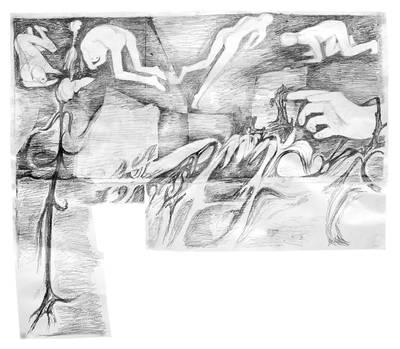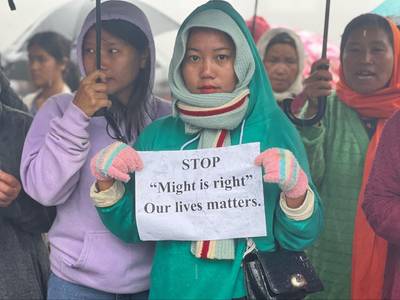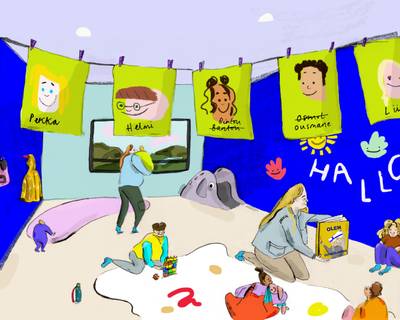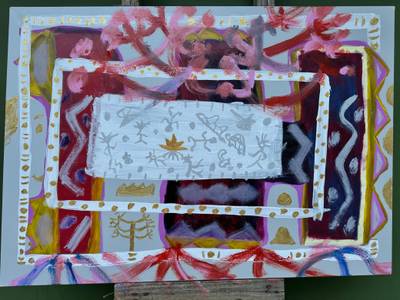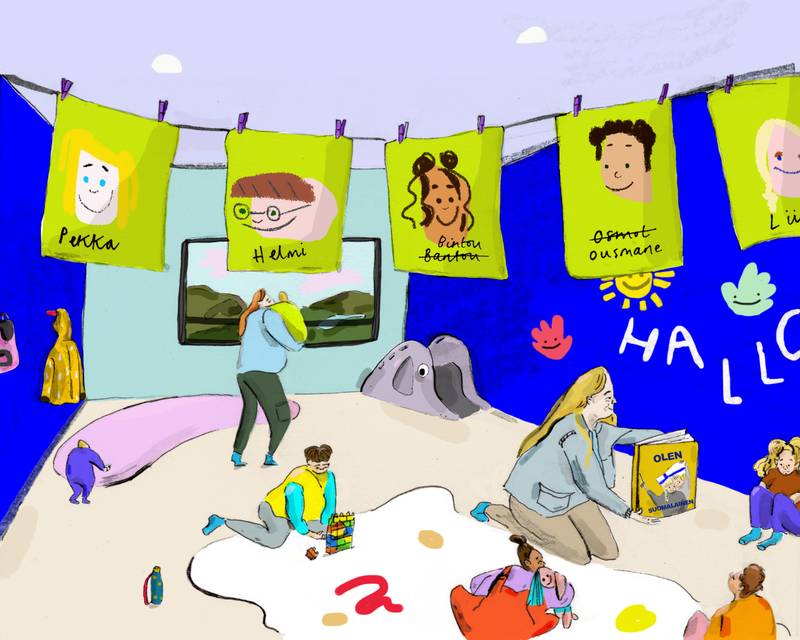

Illustration by Jess Nash
Ndéla Faye is a journalist and writer. When she’s not wallowing in an existential crisis and getting wound up by capitalism and daily microaggressions, she spends her spare time knitting scarves, cocooning with her family, reading fluffy and spicy romance novels, and leaning into her ‘wellness era’.
Educational institutions, just like all other institutions, can be considered microcosms of society, where prevailing attitudes and values manifest. Consequently, as racism permeates Finnish society, it also seeps into Finnish daycares.
I sat down to write this essay, and a wave of uncertainty and doubt washed over me:
Do I really have anything to say about this topic? Are my experiences even that serious? They didn’t mean anything bad by it. Have I made it all up or imagined it all in my head?
I was showing classic symptoms of racial gaslighting, a form of microinvalidation. This type of emotional abuse involves making someone question the validity of their experiences, feelings and beliefs. It is specifically designed to undermine or minimise someone’s experiences of racism. And now, for some unknown reason, I was subjecting myself to it.
Here is my story in a nutshell: I am a black Finnish citizen, and I speak Finnish as my first language. I’ve lived abroad for most of my life, but I moved back to Finland a few years ago with my husband and children. My children started daycare in a municipal nursery in Helsinki, and we have been exposed to a very insidious part of Finnish culture. Despite some of my children’s ‘white-passing’ appearance, their non-Finnish names, coupled with my skin colour, have led them to be racialised as Black or ‘other’.
Before proceeding any further, I must emphasise that I write from a privileged standpoint as a half-white Black person, a native Finnish speaker with a Finnish passport and university education. My experiences are uniquely mine, but the fact that I, a Finn, am not recognised as a ‘true Finn’ implies even greater challenges for individuals in a different position, especially those with non-European passports, darker skin, and limited knowledge of the Finnish language. I feel it’s my duty to lodge official complaints and keep drawing attention to the issues I witness within the system, and I do so in the hopes that it will save someone who has fewer resources than me from experiencing the same.
In the middle of the Covid pandemic – and amidst growing mental health issues among children – in a bid to boost women’s employment rates, the municipal addition was scrapped. There seems to have been very little logic behind the cut (which was significant to many families), as the city of Helsinki’s budget had a surplus and was making a profit. As a result, according to the Education Administration, 2022 saw over 3,000 more 1-year-olds in daycare compared to the previous year. The increase has exacerbated the ongoing staff shortage issue in early childhood education centres throughout the capital, raising significant concerns.
Antiracism is not a priority in early childhood education
In recent years, many daycare centres across Finland have become chronically understaffed, leaving employees exhausted, stressed, underpaid, and overworked, which also inevitably affects the children they care for.
Until 2020, the city of Helsinki paid a supplementary allowance to the parents of children under the age of two who were cared for at home. This municipal allowance was paid in addition to the child home care allowance paid by the national benefits agency, Kela.
In the middle of the Covid pandemic – and amidst growing mental health issues among children – in a bid to boost women’s employment rates, the municipal addition was scrapped. There seems to have been very little logic behind the cut (which was significant to many families), as the city of Helsinki’s budget had a surplus and was making a profit. As a result, according to the Education Administration, 2022 saw over 3,000 more 1-year-olds in daycare compared to the previous year. The increase has exacerbated the ongoing staff shortage issue in early childhood education centres throughout the capital, raising significant concerns.
Subsequently, other important issues such as antiracism and ‘diversity training’ in early childhood education do not even seem to be on the radar for many teachers and caregivers. Although ‘post-Black Lives Matter’, the city of Helsinki pledged to train half of its education staff in “identifying and addressing racism,” conducting over 160 workshops on the topic. After my experiences, I can’t help but think that the training offered to the staff has been nothing more than a tick-box exercise.
One of Helsinki’s early years’ education plan’s core values is “respect for human rights and dignity.” The plan explicitly states that racist and discriminatory behaviour and actions must be “prevented, identified and addressed” and that any form of bullying, racism or violence will not be accepted.
However, this has not been my personal experience at all.
The seemingly insignificant slip-ups accumulate into one huge snowball that pummels me to the ground. In 2021, I discovered my children had played the popular Finnish board game Afrikan tähti, or the Star of Africa, in daycare. Just a few months previously, there had been a national debate about the game and the era of colonialism it represents. When I asked a teacher about why the children were playing the game, she unleashed a deluge of defensiveness on me, using classic defensive statements like “no one is allowed to say anything these days, and I don’t even know how to refer to people anymore, and even the candy with the racist caricature and the chocolate with the n-word have been changed”. Up until that point, I had been willing to give the daycare staff the benefit of the doubt, but after this, it became very clear to me what I was dealing with and the environment my children were spending their days in.
On top of the overt racist statements, there are a number of more covert ways in which the staff’s racism manifests: the employees often confuse my children with other mixed or Black kids in their class, and this has resulted in some potentially dangerous situations. There was a time when my child’s name had been mistakenly crossed off the list of children who had been collected by a guardian, and another time when I received a phone call saying my child had been injured at daycare – but it turned out my child was fine, and the staff had mistaken my child’s name with another child whose name sounds similar (in their opinion).
At daycare, the toys and book characters are very normative, and the whiteness is loud and in-your-face a lot of the time. Sometimes I genuinely feel like Finland is stuck in a time-warp. When my six-year-old told me they had spent the day playing with small plastic figurines depicting “cowboys and Indians”, I became convinced of it. This is not a country that has moved with the times, or is interested in levelling up.
I feel such jealousy and resentment that white Finnish parents and their children can go about their lives without worrying about whether their child will learn to hate themselves because the society around them is sending a very clear message of “you don’t belong here.”
After the twentieth time of my children’s names being commented on by various childcare teachers as “difficult” or after being told for the nth time that their names are “hard for a Finnish person to pronounce”, I am slowly losing faith that this is a system capable of treating anyone not called Anna or Pekka with even a basic level of respect.
When I’ve questioned or confronted the daycare management about it, I’ve been met with extreme defensiveness, dismissiveness, white fragility, or complete silence.
The discrepancies between narrative and reality
My family’s experiences are not isolated by any means; they are just the tip of the iceberg. Anti-Black racism is on the rise throughout Europe, as revealed in a 2023 report by the European Agency for Fundamental Rights (FRA). According to this report, nearly half of people of African descent face discrimination in their daily lives. FRA’s first report in 2016 exposed the widespread and entrenched racism against people of African descent in the 12 European countries surveyed. In both the 2016 report and the latest one, Finland found itself at the top of the leaderboard yet again as one of the countries where Black people face the most discrimination at all levels of society.
Following the 2016 report by FRA, Finland’s Non-Discrimination Ombudsman released an additional report to shed light on the everyday experiences of people of African descent in Finland. The findings were bleak, conclusively illustrating how discrimination and racism have a pervasive impact on the lives of people of African descent in Finland. This issue affects Black Finns from their early years in daycare and throughout their education journey, including school and university, and extends to their housing and job prospects. Frankly, to anyone categorised as “other” in this highly normative society, the results of the report come as no surprise. Nearly one in five respondents said they had encountered discrimination before even reaching school age, during early childhood education.
The concept of Nordic exceptionalism, coupled with a deeply ingrained reluctance to admit that Finland does not, indeed, exist in a vacuum, fosters an environment where issues like class disparities, injustice, white supremacy, and even race are conveniently ignored. Denying the very existence of race enables the denial of people’s tangible experiences of race and racism in Finland. By disavowing the existence of a class system in Finland, we render people’s experiences of it invisible.
Early childhood education is supposed to be all about nurturing children’s imagination and their natural inquisitiveness. It’s supposed to be a time when children have big dreams for the future—of who they want to be, the things they want to do, and what they want to achieve. But what happens when the adults around a child hold some dusty, stereotypical views? Inevitably, this will be reflected on the children and will affect how they are treated.
In the Non-Discrimination Ombudsman additional report, many Finns with African heritage spoke about how their school’s education advisors had systematically guided them towards pursuing studies and a career in nursing and social work – as opposed to medicine, the arts and law, for example.
Contrary to the idealised notion held by many white Finns, racism runs deep in Finnish society. White Finns, through their words and actions, repeatedly reinforce the notion that being Finnish equates to being white. This has been my personal experience in virtually every aspect of my daily life, whether it’s at the doctor’s office, the supermarket, my children’s daycare, or any other interaction with white Finns who do not know me.
The concept of Nordic exceptionalism, coupled with a deeply ingrained reluctance to admit that Finland does not, indeed, exist in a vacuum, fosters an environment where issues like class disparities, injustice, white supremacy, and even race are conveniently ignored. Denying the very existence of race enables the denial of people’s tangible experiences of race and racism in Finland. By disavowing the existence of a class system in Finland, we render people’s experiences of it invisible.
Finland has a record of upholding a narrative where the country played no part in colonialism or other oppressive systems. Similarly, there has been a strong pushback to even admitting that phenomena such as ‘white flight’ and segregation even exist here. I bear witness to these almost daily. I live in an ‘up-and-coming’ (read: formerly working class, now increasingly white middle class) area, and the word on the street—or at least outside the daycare gates—is that many middle-class white parents are concerned about the quality of early childhood education at our local daycare, as well as at the local primary school where our little cherubs will be headed in the next few years.
I chatted with one white Finnish mother about the state of childcare in Helsinki: “The situation is completely fucked up. Out of principle (and of course also for practical reasons), I want my children to attend our local daycare and to go to school at our local primary school. But of course, like all parents, I also want the best possible care and education for my children, and that doesn’t happen in our neighbourhood, where more than half of the children have an immigrant background,” she says.
It is a documented phenomenon that in a ‘white flight’, well-off white populations move out of areas that have a high immigrant population, and usually, families with children are the first ones to move away. With the emergence of more international schools and multilingual streams at schools, many Finnish families are keen to enrol their children in those, with the gentle undercurrent that an “international atmosphere” will enrich their children’s lives. But it is clear that only a certain type of international vibe—preferably middle-class, English-speaking and not Black—is palatable for many white Finnish families.
Admittedly, in the past few months especially, my faith in humanity has been at an all-time low, and I struggle to believe that people in this world have even a basic level of care for fellow human beings. I’m a strong believer in “when people show you who they are, believe them,” and I feel like Finland has shown me repeatedly, over the course of a number of years, who it is. I was born in the 1980s, and I feel like very little has changed. Or, at least, that things haven’t changed at the speed they should have.
Years of scientific study have shown us that cumulative exposures to racism ‘weathers’ the body on a cellular level, resulting in deteriorating health. This is called ‘racial weathering’ – a term coined by Arline Geronimus. It has also been documented that, when children’s stress response systems remain activated at high levels for long periods, it can have a significant wear-and-tear effect on their developing brains and other biological systems. This can have lifelong effects on learning, behaviour, and both physical and mental health.
I wonder how the incessant othering will affect my children: Will they ever feel like they belong here? If their developing nervous systems are constantly under stress, what effect will that have on them later in life? Will they feel like something is wrong with them instead of blaming the closed-minded society around them? Will things ever change?
The only solution, in my opinion, is for this country to drastically change its narrative. Instead of attempting to bolster its PR on a global level, more energy should be spent on being honest about the realities of life here.
The harsh reality of racism within Finland’s daycare system serves as a stark reminder that much work remains to be done. As stories like mine continue to be unveiled, a lot of work needs to be done on dismantling systemic biases and creating an inclusive environment where every child and family is genuinely valued and children from all backgrounds are nurtured and treated with the respect they deserve.
